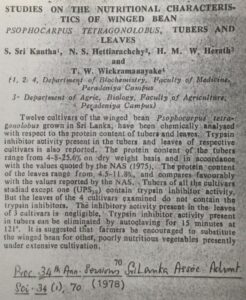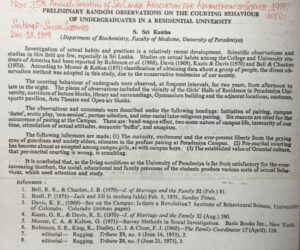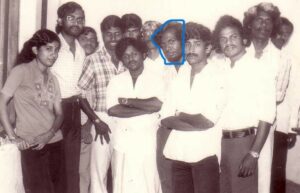My Initial Steps in Sexuality Research
by Sachi Sri Kantha, April 13, 2024
Front Note
21 years had passed since the late Dr Rajan Sriskandarajah posted my essay item ‘Alfred Kinsey as an Apparent Guru: My Sri Lankan experience in Sex Research’ in this site (April 23, 2003. This link is still survives, despite updated versions that became available subsequently https://www.sangam.org/ANALYSIS_ARCHIVES/Sachi_4_23_03.htm
In the digital history of this century, 2003 was like Medieval period. Wikipedia was only 2 years old. And Gmail was yet to be born! To mark the 130th birth anniversary of Alfred Kinsey (1894-1956), that falls on June 23rd this year, to a new generation of readers, I provide a re-formatted, enhanced version below.
Correspondence with Dr. Walter Robert Holmes (1916-1998)
Illinois native Dr Walter Robert Holmes (1916-1998), an American missionary teacher in Jaffna for more than a decade in 1950s, deserve recognition among Eelam Tamils for his book, entitled ‘Jaffna 1980’. In this book, he had included a segment ‘Attitude Toward Sex’ among Jaffna Tamils. I felt that when he collected primary materials for his book, the text of an oral presentation on the sexuality of young Sri Lankans I had made in December 1979 at the Annual Sessions of the Sri Lanka Association for Advancement of Science was unavailable to him. As such, after arriving at the University of Illinois, Urbana Champaign in Aug 1981, I had a postal correspondence with him for a year from October 1981 to November 1982. The details are available in the now defunct Tamil Nation site, with a posting-date Jan 3, 2001.
https://tamilnation.org/forum/sachisrikantha/010103americanambassadors

Fig. 1 – Sachi’s first research abstract 1978
To inform him about my observations, I sent to Dr Holmes (an alumnus of the University of Illinois) a complimentary copy of my short booklet that contained my studies on the sexuality of undergraduates then studying at the University of Illinois.
I had noted that a short paragraph from Dr. Holmes letter had been deleted [marked by dots] by the editor of Tamil Nation site for posting. I restore the deleted paragraph below [indicated in italics] in the letter dated Jan 6, 1982.
Dr. Holmes wrote to me, as follows:
“…I was most interested in your paper on courting behavior, having been Warden of Jaffna College’s undergraduate hostel for several years! It was hard to imagine any Ceylonese young persons being as romantically free as at Peradeniya, because in Jaffna I think they are still pretty conservative. At least I never heard of getting hitched in Jaffna but I do not know the University campus so well, of course. In Delhi I used to read articles about ‘Eve teasing’ which I thought was a beautiful phrase. There is some of that in Jaffna.
Your conclusions on courtship were informative to me. You did not mention pregnancy, so the implication is that the petting does not quite get into intercourse; but exploring female anatomy below the waist cannot go on indefinitely without.
Since I know how rare such determined efforts to get some information about the society are, I particularly appreciate the effort you have made, Sri Kantha, in doing these studies.”
I was thrilled by the sentiments expressed by Dr. Holmes in his last sentence. As an ethnographer, he knew his beans about Eelam Tamils. After all, unlike the ‘official’ American ambassadors who live in Colombo and depart at the end of their three year term, following his Ph.D degree (1946), Dr. Holmes lived in Jaffna between 1947 and 1960. He taught at Jaffna College, Vaddukoddai.
My Initial Steps in Sexuality Research in Sri Lanka
Below I describe my 1978 entry into research in a then virgin (both literally and figuratively) inter-disciplinary territory in Sri Lanka. I was then a temporary assistant lecturer in biochemistry at the Faculty of Medicine, University of Peradeniya, with a monthly salary of about 925 Sri Lankan rupees (equivalent to ~US$58, at the then currency exchange rate of $1 = 16 rupees. When I ventured into this virgin territory of sexuality research in Sri Lanka at the age of 25, I felt that I had an affinity with Alfred Kinsey, the pioneer sex researcher. Kinsey was originally a zoologist with his specialty being in entomology. In 1976, wh
when I graduated with a poor ‘Pass’ in B.Sc (Special) degree in zoology, I also had chosen entomology as my specialty. Due to my sub optimal performance in my first degree, I had to leave from the University of Colombo, after serving as a laboratory instructor (then called ‘demonstrator’) in zoology for an year. Move I did, and I landed in Peradeniya – the location of the only full-fledged residential university in Sri Lanka. It provided me an opportunity to observe my surrounding ‘Nature’. Like a 19th century naturalist, in the traditions of Darwin and Wallace, but with the interest Kinsey kindled in me, I mixed Darwin and Kinsey. Thus, I observed the dating behavior of highest primates – the species to which I belonged. I cannot brag that I was the first to do such an observation in Peradeniya.
Appendix 1 – Courting Behaviour of Undergraduates

Fig.2 – Courting Behaviour of University of Peredeniya Undergrads 1979
Guided by A. V. Hill’s Letter in the Nature
I can certainly brag that I was then the first budding scientist in Sri Lanka to report my Peradeniya observations at a public science meeting for my scientist peers. I was only 26 plus then. Serious observation alone doesn’t make a scientist. That observation has to be reported via an academic journal or a scientific meeting to his/her scientist peers for evaluation. I was committed to follow the steps of Mendel, Darwin and Kinsey.
Call me naïve or shrewd or a show-bag or even vainglorious. But I did something, which none of the temporary assistant lecturer at any of the Faculties of the universities in Sri Lanka wouldn’t have dared to do then. I submitted an abstract of my research presentation without telling any of my senior colleagues at the department and without asking permission from the Head of the Department – which was a ‘No – No’ in the Sri Lankan academic setting then. I wanted to be the sole author of my research communication, and I didn’t want to offer any honorary authorship to my professor and head of the department.
I was partly influenced by a short letter published in the prestigious Nature journal (Feb 5, 1955) by Archibald V. Hill, the 1922 co-Nobelist in Medicine and a gentleman in science ethics. I had studied in my undergrad years about Hill’s contribution to muscle physiology and his was a recognizable name. For it’s biting humor, I reproduce excerpts of this Hill’s letter:
“Mr. Arthur Bryant once told a story which is typical, one hopes, of the sturdy independence of the British people. A dock strike was on, and enormous lorries were going in and out with impressive notices ‘By the authority of H.M. Government’, or ‘By permission of the T.U.C.’. Among them was a tiny donkey cart, driven by a little old man with a bashed-in bowler: on the cart was a notice ‘By my own bloody authority’.”
In the pages of Nature, and of other journals, are many papers whose authors find it necessary to thank the Director of This, or the Chief Scientist of That, or the Ministry of Something or Other, for permission to publish them…
Could this nonsense stop?…..
This letter is published without the permission of the professor of physiology in this College.
A.V. Hill,
Department of Physiology,
University College, London WC 1.”
I was strongly enthused by Hill’s admonition of the stuffy behavior condoned by the professors of academia, and the research atmosphere in Sri Lanka in 1979 was hardly different from what Hill had described from London in 1955. And I wanted to follow the steps (while young in age!), described by Hill in his first paragraph. I had reason for it.

Sachi (circled) with his Peradeniya University Tamil drama troupe- as director, 1979 Mar 14
Making a Splash in December 1979
I was fuming that in the previous year, in 1978, my very first research communication in nutritional biochemistry was diluted by the unwanted addition of the names of two professors (Prof. H.M.W. Herath and Prof. T.W. Wikramanayake), whom I felt didn’t deserve co-authorship. [see, Fig. 1 – abstract]. This was done for reasons of ‘political correctness’ of the then prevailing atmosphere at the University of Peradeniya. It was the norm in Sri Lanka then, and I guess this practice still remains unchanged. Thus I felt that my research in sex sociology – which was carried out by me during my off-duty hours and weekends and also without any research funding support – need NOT be diluted with the names of my superiors.
My first research communication, molded by Kinsey’s flame was a provocative affair. I presented my observations on the second day of the 35th Annual Meeting of the Sri Lankan Association for the Advancement of Sciences, held at the University of Colombo premises. My diary entry for December 18, 1979 recorded the following:
“Today I presented 4 papers. In the morning at 8:30 am, at Section A, I read the two biochemistry papers.
- Further studies on the nutritive value of edible portions of 16 cultivars of winged bean, Psophocarpus tetragonolobus.
- Development of trypsin inhibitor in the seeds of winged bean.
Then, in the afternoon at 1:00 pm, at Section F, I read two other papers. The New Biology Lecture Theatre was a room with nearly 60 seats. But more than 75 had gathered. The obvious reason was the provocative title I had given for my first paper:
‘Preliminary random observations on the courting behavior of undergraduates in a residential university’. [ see, Fig 2 – Abstract] My second paper, which followed the first, had a more sedate title: ‘A sociological study of the 1978 Medical Entrants (Tamil medium) of the University of Peradeniya’. I had to drastically shorten the presentation time of the second paper [an equally important one for me], since its allotted presentation time was almost gobbled up by the first paper’s question time.”
I still vividly remember that the presiding chairman of the Sessions, suggesting whether I take the questions for both papers after the presentation of both; but the sexually-curious species among the audience were interested in throwing question darts on me for the first ‘courtship’ paper and leave the room for the sociologically-inclined to tackle the second paper. Thus, at the end of my 20 minutes presentation of the ‘courtship’ paper, the question session continued for another 20 minutes. I was bombarded with various questions on methodology and how did I ‘observe’ the petting behavior. I was sure that those who posed questions like this were unfamiliar to the Peradeniya campus terrain. For those who had lived in the Peradeniya campus residential environment, what I presented was ‘too obvious’. Finally the presiding chairman of the Sessions had to terminate the question period, for want of time.
Without losing my cool, I diplomatically answered the questions by pointing the first three carefully chosen words of my paper’s title: ‘Preliminary Random Observations’. I took leave with remarks that ‘Since these observations are preliminary in nature and I’m still collecting data and, that one has to wait until the following year (i.e., 1980) for the sequel.’
My diary entry for Dec 18, 1979 concluded, that having been relieved of presenting four papers in a single day, I went to the Sapphire theater for a 6:00 pm show, to enjoy a Sivaji Ganesan movie Theepam, before leaving for Peradeniya next day morning at 5:55 am train.
Teasing by senior peers at the Department of Buiochemistry
When I returned to Peradeniya, Dr. Navam Hettiarachchy – my then senior colleague and research supervisor – and a few other faculty members teased me by saying ‘Now the secret has come out on why Sri Kantha don’t stay in the lab after 5:00 pm on weekdays and hardly turns up to do his Master’s degree research in the weekends. He must have been checking all the corners and bushes surrounding the buildings.’ I had no retort for that teasing. Importantly, Prof. Wikramanayake, the head of the department, did not utter a word. I was a bit scared about whether he would pull my ears asking why I didn’t get his formal permission before submitting the research abstract for my paper – the routine protocol then followed, in the colonial British tradition. In hindsight, I believe that there was another reason for this spurious ‘tradition’ to keep living in Sri Lanka. The professor and the head of the Department, being the most senior individual, was assumed to possess the best English capabilities in the nearest circle. Therefore, even for checking the English, submitting one’s research abstract and completed manuscript to the professor was a given, prior to mailing. If a junior academic submit a manuscript to the professor simply for checking the English and without professor’s name as a co-author,that would also be a cause of concern. As such, unwanted addition of the professor’s name as a honorary author also became an unquestionable, unethical practice in Sri Lanka.
But, I wanted to stand on my own leg. Thus, Prof Wikramanayake’s silence was fine with me. Like a gentleman, he did extend my period of stay as a temporary assistant lecturer by another whole year for 1980, prior to his move to the University of Ruhuna, to establish the medical faculty there.
Informants and weaknesses in the Manuscript
Four items need mention. First, in the Methods section, I had stated that I used the ‘direct observation’ method for this study, without any numbers to substantiate my observations. But I also used informal interviews to write this manuscript and had gathered some numbers. I used self-restraint in not pushing some numbers without solid back-up data. As my informants were half a dozen (then) junior academics and ten students at the University of Peradeniya, for reasons of privacy I had to mask their identity. My informants included my male room mates at the Jayatilleke and Arunachalam Halls of residence as well as one private lodging in the campus vicinity (Rajawatte). Now I can mention those junior academics – S, Surendrakumar, K. Kandiah, P. Vivekanandan, V. Mathavan, P. Pushparaj and B.G. Padmabandu. The last mentioned was a Sinhalese. In addition, two of my Sinhalese graduate peers Rohan Rajapakse and H.A.S. Perera as well as (then) medical undergraduates S. Sugumaran (son of T. Sivasithamparam – the then MP for Vavuniya constituency, 1977-83) and N. Shanmugalingam also served as my confidants cum informants.
Secondly, the text suffered from a bias of male chauvinism. This was inevitable because all my informants were unmarried young men in their twenties. This was a serious limitation to my study.
Thirdly, not to be a prude, I have to admit that I was also a participant-observer of few aspects of the courtship ritual described in the study. These included con-sessions, partner selection and initiation of pairing. At the ‘initiation of pairing’ step, I faltered miserably twice. This fact was a secret to all my informants, excluding S, Sugumaran – one of my confidants.
Fourthly, having realized the limitation on the lack of input from women from Peradeniya campus, I had to modify my ‘lone wolf’ approach to sex research in Peradeniya and was tempted to seek collaborators.
Aftermath
My journalist friend S Rameswaran, fishing for some interesting local research data for popular consumption, translated the original text of my Peradeniya courtship paper into Tamil with reasonable liberty and published excerpts in the Virakesari (Colombo) daily newspaper of Nov 16, 1980. That resulted in me receiving my quota of ’15 minutes of fame’ among the then Tamil undergrads in Sri Lanka and the Tamil parents whose children were about to enter the University of Peradeniya. At Peradeniya, few of my informants told me that (like a politician) my name also had become an object of two or three campus graffiti. I had to provide a researcher’s response for the ‘storm in the teacup’ and it appeared in the Virakesari of Jan 25, 1981.
In 1980, due to preoccupation of completing the Master’s degree in biochemistry, the full text of my ‘Preliminary Random Observations’ was NOT submitted to an academic journal. However, scientists had followed a mantra for the past three centuries that ‘Research is NOT completed, until the results gets printed in paper’. Rather than letting my initial attempt to get lost, I included this study as Appendix 1, in my first volume of autobiography, published in 2004. For digital preservation, a pdf file of this Appendix is provided nearby. I have NOT made any alteration to the text I prepared in 1979.
*****
I hope you’re doing well too! I’m curious about your publications in the Far Eastern Economic Review, particularly the November 1991 edition. Do you have any images of that specific edition, or perhaps other magazine clippings related to the Eelam Tamil cause that you could share?
One aspect that stands out in this article is Dr. Sachi’s c courage in submitting a research paper without giving credits to superiors for namesake. During my brief stint as a scientist I too attempted this and burnt my fingers, but Dr. Sachi could do it successfully.